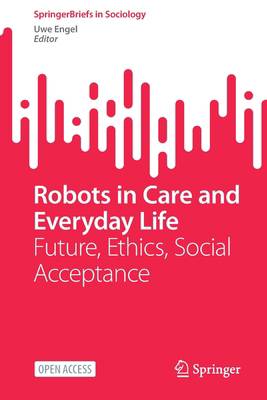
- Afhalen na 1 uur in een winkel met voorraad
- Gratis thuislevering in België vanaf € 30
- Ruim aanbod met 7 miljoen producten
- Afhalen na 1 uur in een winkel met voorraad
- Gratis thuislevering in België vanaf € 30
- Ruim aanbod met 7 miljoen producten
Zoeken
Robots in Care and Everyday Life
Future, Ethics, Social Acceptance
€ 31,95
+ 63 punten
Omschrijving
This open access book presents detailed findings about the ethical, legal, and social acceptance of robots in the German and European context. The key resource is the Bremen AI Delphi survey of scientists and politicians and a related population survey. The focus is on trust in robotic assistance, human willingness to use this assistance, and the expected personal well-being in human-robot interaction. Using recent data from Eurostat, the European Social Survey, and the Eurobarometer survey, the analysis is extended to Germany and the EU. The acceptance of robots in care and everyday life is viewed against their acceptance in other contexts of life and the scientific research. The book reports on how the probability of five complex future scenarios is evaluated by experts and politicians. These scenarios cover a broad range of topics, including the worst-case scenario of cutthroat competition for jobs, the wealth promise of AI, communication in human-robot interaction, robotic assistance, and ethical and legal conflicts.
International economic competition alone will ensure that countries invest sustainably in the future technologies of AI and robots. But will these technologies also be accepted by the population? The book raises the core issue of how governments can gain the needed social, ethical, and user acceptance of AI and robots in everyday life.
This highly topical book is of interest to researchers, professionals and policy makers working on various aspects of human-robot interaction. This is an open access book.
International economic competition alone will ensure that countries invest sustainably in the future technologies of AI and robots. But will these technologies also be accepted by the population? The book raises the core issue of how governments can gain the needed social, ethical, and user acceptance of AI and robots in everyday life.
This highly topical book is of interest to researchers, professionals and policy makers working on various aspects of human-robot interaction. This is an open access book.
Specificaties
Betrokkenen
- Uitgeverij:
Inhoud
- Aantal bladzijden:
- 130
- Taal:
- Engels
- Reeks:
Eigenschappen
- Productcode (EAN):
- 9783031114465
- Verschijningsdatum:
- 14/10/2022
- Uitvoering:
- Paperback
- Formaat:
- Trade paperback (VS)
- Afmetingen:
- 156 mm x 234 mm
- Gewicht:
- 208 g

Alleen bij Standaard Boekhandel
+ 63 punten op je klantenkaart van Standaard Boekhandel
Beoordelingen
We publiceren alleen reviews die voldoen aan de voorwaarden voor reviews. Bekijk onze voorwaarden voor reviews.










